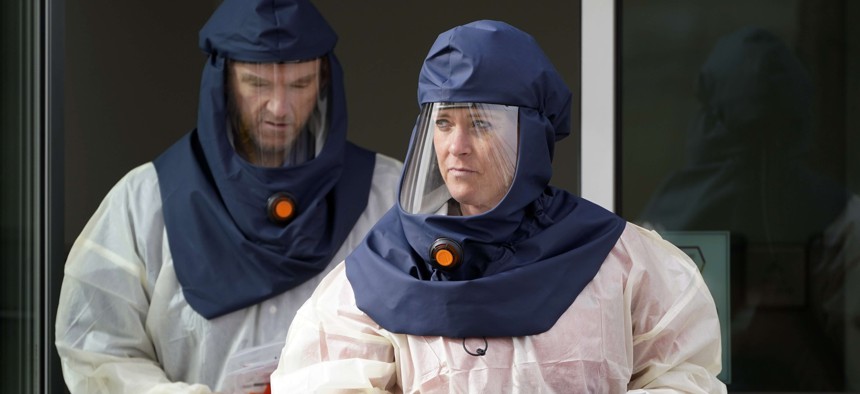In One Western State, Warnings of Strain on Hospitals as Virus Surges

In this Friday, Oct. 23, 2020 photo, Salt Lake County Health Department public health nurses look on during coronavirus testing outside the Salt Lake County Health Department in Salt Lake City. AP Photo/Rick Bowmer, File
“We cannot continue to argue that health care will do just fine regardless of the demand. That is not true,” says one doctor.
Utah officials, including Gov. Gary Herbert, are warning that surging coronavirus cases are putting a strain on the state’s hospital system, urging residents to wear masks and follow other public health guidelines to help control the spread of the virus.
“The hospitals frankly just can't keep up with the trend that we have going,” Herbert, a Republican, said in a news conference this week.
The seven-day rolling average for new confirmed cases per day, as of Thursday in the state, climbed to around 1,600, from closer to 400 back in early September. Herbert said the state is “just far too close” to overwhelming its hospital and medical system given the current trajectory with the spread of the virus.
Utah is one of a number of states in the Mountain West and Midwest that have seen cases spike to new highs in recent weeks. Nationwide, the U.S. just had its worst week for the virus spreading, with over a half-million new cases recorded, according to The New York Times.
Herbert emphasized that, in Utah, mask wearing is “no longer just a pleasant request.” While the state does not have a statewide mask order in place, it does have mask requirements in effect for public gatherings, K-12 schools and for counties where virus rates are high—23 of the state’s 29 counties as of Friday. Utah is also asking people to limit the size of social gatherings.
Despite rising case counts and warnings from officials, backlash against government mandates meant to help slow the spread of the virus continues to occur in Utah—as in other states. “Anti-mask” protesters gathered this week outside the home of Utah’s state epidemiologist, Angela Dunn, after her address was shared online.
“It’s scary,” she said.
“It's taken a really big toll on my family and myself,” Dunn added. “I think it's really unfortunate that we live in a state where people feel that it is ok to harass civil servants.”

Hospital officials in Utah caution that spiking virus cases could stress hospitals to the point where they have to enact “crisis standards of care” to guide how resources like staff, intensive care beds and drugs are rationed when they begin to fall short of demand.
“Crisis standards is a possibility. It’s one that we plan for, but it’s also one that we try hard to avoid,” said Mark Shah, an emergency physician who has worked on helping the state prepare for situations where the crisis standards of care come into play.
The problem that arises for hospitals when coronavirus cases surge is that they are suddenly dealing with patients who have the virus on top of their normal stream of patients who are experiencing medical issues ranging from heart attacks to traumatic injuries.
Greg Bell, president and CEO of the Utah Hospital Association, said that among about 16 “referral center” hospitals that have the capacity to handle complex coronavirus cases there are around 453 intensive care unit beds, with a little bit of additional contingency space.
"We have less than a hundred beds to hit that 453 number,” Bell said. He added that a hotspot area to watch in Utah is St. George, in the southwest corner of the state, which has become a popular enclave for second homeowners and retirees.
Shah said that about 5% of virus patients typically require hospitalization, and of those people about 20% to 30% end up in intensive care units.
“We cannot continue to argue about masking, we cannot continue to argue about whether this pandemic is real or made up,” Shah said. “And we cannot continue to argue that health care will do just fine regardless of the demand. That is not true.”
Bill Lucia is a senior reporter for Route Fifty and is based in Olympia, Washington.
NEXT STORY: The Ballot Measures to Watch: Marijuana, Gig Workers, Ranked Choice Voting, and More






